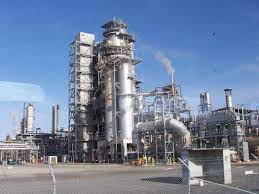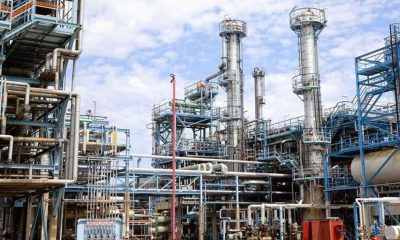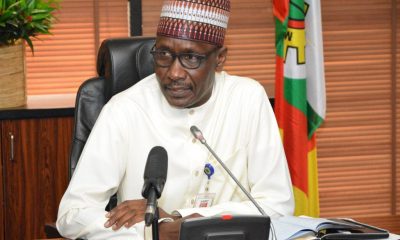Business
Updated: Reps to probe alleged sabotage at Warri refinery

The House of Representatives is set to investigate alleged sabotage at the Warri Refining and Petrochemical Company, which has reportedly stalled its operation.
It has therefore asked the Group Managing Director of the Nigerian National Petroleum Corporation, Mele Kyari, to furnish its Committee on Petroleum Resources (Upstream) with details and circumstances surrounding the storage lease at the company.
The lawmakers mandated the committee to investigate the failure and the neglect by the NNPC to address the haulage challenges such as inadequate storage tanks affecting the Warri refinery to forestall the frequent shutdown of the company and report back to the House in four weeks.
The House passed the resolutions following a motion by Ben Igbakpa (Delta PDP) on the commencement of operations at the Warri Refining and Petrochemical Company.
Igbakpa said the refinery had been mandated to produce refined products from local crude and that the three main sections of the production department, namely: reforming, crude distillation and catalytic cracking units had operated for the past eight years due to the efforts of its personnel.
The lawmaker said the plants were operating at an output of around 115m3/hour translating to about 68 per cent installed capacity.
He listed products being supplied from the refinery as premium motor spirit (PMS) or petrol, automotive gas oil, kerosene, LPG, low pour fuel oil for ships and industrial fuel and carbon black.
The lawmaker said, “The House is disturbed that the refinery has not operated optimally due to alleged top management decisions of the Nigerian National Petroleum Corporation (NNPC) to ground the plant for personal benefit from marketers importing products that can be produced in the refinery;
“Concerned that the plant had severally shut down due to haulage challenges, neglect in the evacuation of products, lack of functional or operational storage tanks and poor maintenance culture on the part of management which also constitutes another reason for the refinery non – functionality;
“Aware of the alleged plan to ground the plant from refining products by members of the top echelon of the Warri Refinery in collaboration with the Chief Operating Officer (COO) as well as diverting crude meant for refining.”
He also said he was “aware that when crude oil is delivered from Escravous tank farm for refining, the products are hoarded for about 14 days and thereafter diverted through the refinery jetty to interested buyers (or specific companies they have special interests in) who pay less. The resultant effects of this perceived economic sabotage is that the plant is brought down because no crude to refine as it has been diverted.
“Further aware that when it became apparent that the management of Warri Refinery has abandoned their responsibility of maintaining the plant, the staff of the refinery on several occasions contributed their money to buy materials and tools to fix faulty equipment.”
The lawmaker said that it was alarming that “currently, most of the spherical tanks used for storage of Liquefied Petroleum Gas (LPG) have been leased out to Kwale Hydrocarbon Nigeria Limited (KHNL), a private company, while other storage tanks are being leased out to private interests all in a bid to ensure that the Warri Refining and petrochemical company remains shut down indefinitely, even when the said refinery has the production capacity of 75 per cent.”
He alluded to the inadequacies at the refinery and others as largely responsible for the crisis in the nation’s petroleum industry sector with regard to supply and pricing.
He said, “Cognizant that the Federal Government has officially confirmed the return of fuel subsidy, as the Petroleum Products Pricing Regulatory Agency (PPPRA) has on 11 March 2021 fixed the pump price of PMS also known as petrol, at N212.61 per liter, for March, which the Minister of State for Petroleum Resources and NNPC has denied yet petroleum marketers sell between N175 – N200 depending on the location;
“Also cognizant that the increase is due to the shutdown of local refineries and create the cost elements of the commodity which the Petroleum Products Price Regulatory Agency ( PPPRA) analyzed as comprising the addition to the ex-coastal price of average lightering expenses, Nigerian Maritime Administration (NIMASA) charges, jetty throughput charges, storage charge and average financing costs with the inclusion of retailers’ margin has now brought the pump price of the commodity to 212.61 per litre.”
Business
Dangote Refinery: MRS, other filling stations increase petrol price
Dangote Refinery: MRS, other filling stations increase petrol price
The price of petrol has surged to N930 per litre in Lagos and N960 in northern states, following the recent suspension of naira payments for crude oil by the Dangote refinery.
MRS filling stations implemented the new pricing structure on March 28, 2025, marking a N70 increase from the previous rate of N860 in Lagos and N80 higher than the former N880 in the North.
Other fuel retailers have also adjusted their prices, with NIPCO reportedly selling at N930 per litre in Magboro, Ogun State, on Saturday.
According to MRS Oil & Gas, trucks will load products from its Lagos depot and distribute them across the country at varying costs.
The company’s latest pricing document confirms that Lagos has the lowest fuel rate, while northern states face the highest prices. However, the company did not specify whether it sourced its supply from the Dangote refinery.
Under the revised price framework, petrol now costs N930 per litre in Lagos, N940 in other South-West states, and N960 in the South-South and South-East regions, including Edo, Abia, Akwa Ibom, Bayelsa, Rivers, Cross River, and Enugu.
READ ALSO:
- Ex-Rivers HoS wife cries for help over husband’s safety
- Fubara reacts as Ex-HOS, Nwaeke accuses him of bombing oil pipelines, Rivers Assembly
- Natasha: Emmanuel Uduaghan threatens to sue Senator Nwaebonyi
In the North, Abuja, Kaduna, Benue, Kogi, Niger, Sokoto, Kebbi, and Nasarawa will pay N950 per litre, while Zamfara, Kano, Jos, Bauchi, Taraba, Adamawa, Borno, Katsina, Jigawa, Gombe, and Yobe will pay N960.
The Free Carrier Agreement (FCA) price, which determines how much marketers pay before reselling fuel, also differs by region. Lagos has the lowest FCA price at N905 per litre, whereas states like Borno, Taraba, Adamawa, and Yobe have FCA prices around N888 per litre.
The recent suspension of the naira-for-crude initiative by the Dangote refinery was attributed to discrepancies in crude oil allocation. Sources indicate that the Nigerian National Petroleum Company Limited (NNPCL) allocated large volumes of crude to foreign creditors to settle outstanding loans, making it difficult to sustain local transactions in naira.
As a result, independent fuel importers have taken advantage of the situation, increasing depot prices. Industry analysts warn that the rising petrol costs could drive up transportation fares and the prices of goods and services.
Experts suggest that prices may stabilize once the Dangote refinery secures a reliable crude oil supply from NNPCL and resumes selling in naira. Until then, consumers across the country will have to contend with higher fuel costs.
Dangote Refinery: MRS, other filling stations increase petrol price
(PUNCH)
Auto
Lanre Shittu Motors to endow Automobile Department of Lagos Technical College

Lanre Shittu Motors to endow Automobile Department of Lagos Technical College
Lanre Shittu Motors has announced a novel idea that will boost automobile studies in a Lagos technical college.
Specifically, it has pledged to adopt the Automobiles Department of the Government Technical College, Aso-Soba in the Festac area of Lagos.
This is intended to raise academic and practical programme standards of the school.
The company said this would involve adequate funding, in-school training and intensive industrial training (IT) with welfare package to encourage more young people to pursue academic career in automotive engineering.
Business Support/Admin Manager of LSM, Mr Babatunde Adenuga, disclosed this in Lagos, in an interview with journalists.
Adenuga represented the LSM Managing Director, Mr Taiwo Shittu, at the just concluded Engineering Week of the college sponsored by the auto company, where he unveiled the plan to the staff and students at the event’s grand finale.
Aside from the needed financial support to make the auto department functional and standard, he said LSM would provide the tools, overall wears/workshop uniform, among others, as part of the welfare package for the students.
He said it would be a win-win situation for the school and the company.
Adenuga said, “The school will benefit immensely from the LSM package for the department as we take the financial trouble of running the department away from them.
“Students from the department can come for their internship at LSM workshops, and getting jobs after school won’t be difficult.
“For us, it will be a seamless arrangement in getting suitable personnel familiar with our training and business orientation.”
He also said the LSM had been absorbing students from the school and others for their industrial training (IT), providing them with useful hands-on training and monthly stipend to keep them going.
The LSM MD, Taiwo Shittu, commenting on the support, said, “We’ll be part of the progress of the school. We want to own a department in the technical college, the automobile department of studies that will enable us to fund the place; take care of the welfare of students, providing the tools, overall uniform and other facilities.”
“At LSM, we see training the youths as part of our Corporate Social Responsibility. Every year, we take in youths into our facility and train them; even while in training, we give them stipends.”
The highpoint of the LSM-sponsored Government Technical College event was the presentation of prizes to outstanding students in the various competitions held for the Engineering Week.
Three of the students whose projects stood out such as locally produced water pumping machine and water heater went home with impressive cash awards.
Principal of the college, Mr Folarin Sunkanmi, expressed appreciation to LSM for the interest in the school, starting with giving the students the opportunity for industrial training and offering them monthly stipend.
The principal commended the LSM efforts of sponsoring the engineering week’s activities, whose theme was given as ‘Engineering for Sustainable Development (Innovators of tomorrow)’
He urged other companies to emulate the LSM example in order to boost the employability chances of products of the technical colleges and engineering departments of higher institutions in the country.
Business
Elon Musk sells X to AI startup for $33 billion

Elon Musk sells X to AI startup for $33 billion
Billionaire entrepreneur Elon Musk has announced the merger of his artificial intelligence startup, xAI, with his social media platform, X, in an all-stock transaction valued at $45 billion.
This move brings xAI’s valuation to $80 billion, while X is valued at $33 billion.
Both xAI and X are privately held entities under Musk’s control.
The two companies share notable investors, including Andreessen Horowitz, Sequoia Capital, Fidelity Management, Vy Capital, and Saudi Arabia’s Kingdom Holding Co.
Musk, in a post on X, stated that the merger would combine their data, computing power, distribution, and talent to create more advanced AI-driven experiences while staying committed to their core mission of truth and knowledge advancement.
“@xAI has acquired @X in an all-stock transaction. The combination values xAI at $80 billion and X at $33 billion ($45B less $12B debt).
Since its founding two years ago, xAI has rapidly become one of the leading AI labs in the world, building models and data centers at unprecedented speed and scale.
READ ALSO:
- Barbaric mass burning of innocents in Edo, by Farooq Kperogi
- Investigation of wanted businesswoman Achimugu not linked with Atiku, Sanwo-Olu – EFCC
- No Sallah durbar festival in Kano this year – Police warn
X is the digital town square where more than 600M active users go to find the real-time source of ground truth and, in the last two years, has been transformed into one of the most efficient companies in the world, positioning it to deliver scalable future growth.
xAI and X’s futures are intertwined. Today, we officially take the step to combine the data, models, compute, distribution and talent. This combination will unlock immense potential by blending xAI’s advanced AI capability and expertise with X’s massive reach. The combined company will deliver smarter, more meaningful experiences to billions of people while staying true to our core mission of seeking truth and advancing knowledge. This will allow us to build a platform that doesn’t just reflect the world but actively accelerates human progress.
I would like to recognize the hardcore dedication of everyone at xAI and X that has brought us to this point. This is just the beginning,” he stated.
xAI’s growing footprint in AI
Founded less than two years ago, xAI aims to “understand the true nature of the universe.” The company has been developing large language models and AI tools, positioning itself as a direct competitor to OpenAI, a company Musk co-founded in 2015 before exiting due to strategic differences.
In June 2024, xAI announced plans to build a supercomputer in Memphis, Tennessee, to train its AI chatbot, Grok. By September, Musk revealed that part of the Memphis-based supercomputer, called Colossus, was already online.
xAI’s rapid expansion has drawn scrutiny from environmental and public health advocates, who cite a lack of community input in its Memphis project. The Colossus supercomputer is powered by natural gas-burning turbines, and xAI plans to expand operations with a nearby graywater facility.
Elon Musk sells X to AI startup for $33 billion
-

 Uncategorized21 hours ago
Uncategorized21 hours agoBreaking: Moon sighted in Saudi, UAE, others, Eid-Fitr holds Sunday
-

 metro2 days ago
metro2 days agoEFCC re-arraigns son of ex-PDP chairman for alleged N2.2bn oil subsidy fraud
-

 metro1 day ago
metro1 day agoFubara reacts as Ex-HOS, Nwaeke accuses him of bombing oil pipelines, Rivers Assembly
-

 metro17 hours ago
metro17 hours agoRamadan ends in Nigeria, Sultan announces March 30 as Eid-el-Fitr
-

 metro2 days ago
metro2 days agoWe welcome Gov Makinde’s U-turn on Shari’ah panel – MURIC
-

 Uncategorized2 days ago
Uncategorized2 days agoObasanjo’s position on Rivers emergency rule hypocritical, says Presidency
-

 Opinion1 day ago
Opinion1 day agoBarbaric mass burning of innocents in Edo, by Farooq Kperogi
-

 metro1 day ago
metro1 day agoEx-Rivers HoS wife cries for help over husband’s safety












